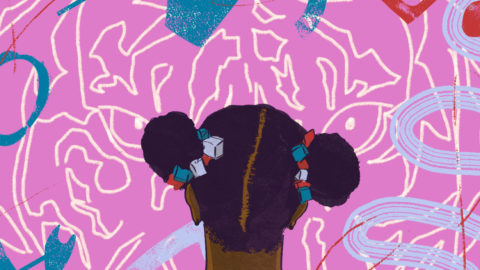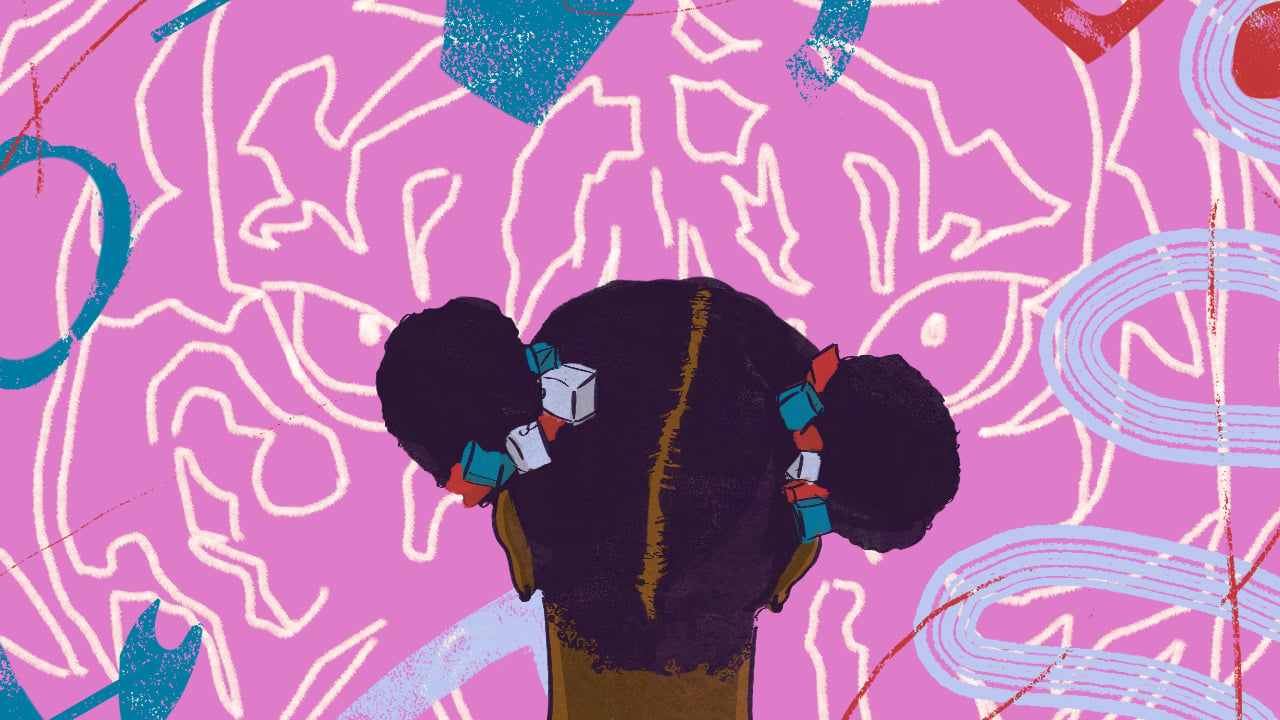Being a Tiger Mom Is an Act of Love—and Necessity
For Black parents, pushing your child to excel above and beyond isn’t a choice, it’s a way to make sure they survive

It’s the Saturday before a long weekend, before the COVID-19 pandemic spread and the entire world changed. I’m at a trampoline park in Aurora, Ont. with several other parents, all relaxing and talking as they watch their kids run wild, jumping and playing to their heart’s content. And here I am, huddled in a corner on a makeshift chair, a ledge with enough room for me to lean against, laptop out, laser focused on my screen and typing away.
From the trampoline, my daughter is yelling: “Mommy, mommy, 1-2-3 eyes on me, eyes on me mommy.” For a moment I pause, obey her instructions and focus on my daughter as she shows me how she can bounce, leap off of the wall and do a spin. I give her a quick thumbs up and look back at my laptop, but not before I see the other parents eye me and shake their heads, likely wondering what work is so important that this mother can’t put away her laptop for one hour and focus on her kids.
What the other parents don’t know is that I’m not doing paid work or getting to the next level on Candy Crush. Sitting at the play park, furiously tapping at my computer, I’m not working overtime at a job that will help me climb the corporate ladder and pad my bank account, leaving a healthy financial legacy for my kids. I’m writing content for the website of a new organization called Parents of Black Children that I co-founded with a group of Black parents. It’s an organization that’s specifically dedicated to advocating on behalf of Black children in the province.
I’m working through this moment to leave a different type of legacy for my children—a legacy of equity. Because my nine-year-old son and six-year-old daughter are Black children in the public education system. And this means that I must fight and advocate for their safety and wellbeing in school. It means that I have to become an activist, even though I don’t necessarily want to be, because across Canada there is a crisis in our education systems. It’s called anti-Black racism.
Anti-Black racism is prejudice, beliefs, stereotyping and discrimination that is directed at Black people. As Robyn Maynard, the author of Policing Black Lives: State Violence in Canada from Slavery to the Present emphasized, this prejudice has persisted for centuries, beginning with slavery. It’s a prejudice that still exists today, and it’s everywhere. It’s prevalent within institutions like the Toronto Children’s Aid Society where, despite accounting for only 8% of the population, Black children made up 41% of the children taken in by the Children’s Aid Society (CAS) in 2015. It extends to policing—Black Canadians are disproportionately accosted and carded by police and in Toronto, are 20 times more likely to be shot by police than others. And finally, anti-Black racism is prevalent in the education system, where Black students are regularly subjected to the N-word.
It is a crisis that means that Black children leave their homes daily and enter a school system that thinks nothing of calling police and handcuffing them at six years old. It’s a system that sees higher school suspension rates for Black children; a 2017 York University study by Dr. Carl James—which looked at the experience of Black students in the Toronto District School Board—found that Black students in the sampled cohort were more than twice as likely than their white and other racialized peers to have been suspended at least once during high school. (FYI, the term “racialized” refers to individuals or groups who are non-white or a part of ethnic communities, and acknowledges that race and the inequity that stems from it is a social construct). The study also found that Black students are disproportionately expelled from TDSB schools. It’s an education system that often bans Black parents trying to advocate on their child’s behalf from school property. And it’s a system that has turned me into a tiger parent.
For many Black parents, being a tiger mom isn’t really a decision
The notion of “tiger parenting” wasn’t something I was even familiar with until I was asked to appear on The Mel Robbins Show in February 2020 to discuss the parenting style. The team told me that, based on a previous article I’d written about helicopter parenting, my parenting style was that of a “tiger parent.” This drove me immediately to the internet where I learned that tiger parenting in fact described many of the Black mothers I know.
A 2013 study by the American Psychological Association, describes tiger parenting as a parenting style that involves both high levels of negative parenting (e.g. enforcing strict rules) and high levels of positive parenting (e.g. providing warmth and support). Tiger parents push their children to attain great levels of academic achievement or success by coupling authoritarian parenting methods with positive ones.
Thought to have been coined in 2011 by author Amy Chua in her book Battle Hymn of the Tiger Mother, many definitions of tiger parenting are tinged with negativity. Most often, the term is used in reference to Asian parents and families, with people leaning on the long-held negative stereotype that Asian parents aggressively push their kids to be perfect. Interestingly, tiger parenting is a term not commonly used in reference to Black parenting. Perhaps because Black parenting has, within pop culture, been reduced to a caricature. The idea that Black mothers can’t possibly be balanced individuals or invested in their children because they’re either the angry, finger-snapping mama seen in movies often by director Tyler Perry, or stereotyped as not having had their kids on purpose and are thus uninterested in raising them is prevalent within pop culture, and beyond. (Which, seriously?!)
There’s much to unpack in this idea that pushing your children through tiger parenting is negative and inherently tied to racialized people. But for myself, and many other Black parents, tiger parenting isn’t necessarily about being an authoritarian or pushing your children into high achieving careers and socioeconomic positions— it’s about the literal survival of our children. Tiger parenting style is layered and, contrary to popular belief, is inherently nurturing, especially as a Black tiger mom because as Black parents, we have to be nurturing. We have to make up for the harshness our kids will face in society. As one mother told me recently, “Hold your babies and hug them tight for our ancestors who didn’t have that privilege.” As Black parents, we need to be the safe space for our kids and shield them from a world that can often treat them harshly because of their race.
It’s a reality that’s incredibly unfair, but isn’t really be a surprise to anyone who’s tuned in to the ways of the world. The statistics tracking the experience of Black people in Canada are alarming across the board. On top of the stats concerning Black children in foster and group homes mentioned earlier, Black Canadians face higher than average unemployment, with the unemployment rate standing at 12%, while the average for non-Black Canadians is 5%. And when Black people do have jobs—per a joint 2019 study by McKinsey & Company and LeanIn.Org—advancement is difficult and seeing yourself reflected in leadership is sparse, especially for women of colour. And then there is policing. A 2019 report commissioned by the City of Montreal found that Black and Indigenous people were four to five times more likely than white people to be stopped by police. And this is not unique to Montreal.
“As a Black parent, it makes me so sad how early the biases against our sons and daughters start, from teachers who expect that our boys can only amount to becoming basketball players, to the adultification of our daughters,” says Tanya Hayles, founder of the Toronto-based online group Black Moms Connection. “Black parents have an even bigger burden to [raise] children who know and believe in their own potential.”
Being a tiger mom is an act of love—and necessity
That belief in your child’s potential is key to the tiger parenting style. Ensuring that your kids live up to their full potential means being hyper-vigilant about seemingly small things like homework. You can’t afford to let your child skip doing their homework when the consequences for them is that they won’t get the benefit of the doubt about their abilities. The reality is if Black parents aren’t pushing their kids, it’s unlikely that push will come from outside the home.
“We still live in a white supremacist society,” Hayles says. (Have doubts? Try checking out stats around racism in Canada). “Every institution, from legal and political to financial, is controlled by people who have an inherent bias towards Black and Indigenous folks, and people of colour. In order to move up the social hierarchy ladder, we have to work twice as hard.”
And she’s right. For Black people, climbing the corporate ladder can be particularly challenging. A recent lawsuit by Black female staff working in Ontario’s Public Service highlighted the challenges that Black staff face in their efforts to seek advancement to senior management positions. In Ontario’s Public Sector (OPS), racialized groups make up 23% of the workforce but only make up between 9 and 17% of senior or executive management positions, with the number decreasing as positions become more senior. (This stat excludes Indigenous people, who account for 3% of OPS workers and make up between 1 and 4% of senior/executive positions.)
That means that, for my kids, the additional French and math tutoring and extracurricular activities, like violin and guitar, dance, basketball and soccer, that I enrol them in are essential as they develop into little humans who understand the value of hard work and the challenge of having to work twice as hard as everyone else for—in the famous words of Scandal’s Olivia Pope— “half as much.” If tiger parenting sounds exhausting to you, that’s because it is. My motherhood experience means that I need to be on top of my kids while simultaneously providing a loving and nurturing environment. Because my children simply won’t have the same leeway to make the same mistakes that others may as they grow up. And the risks of those mistakes for Black children are too high.
“It’s hard to break through centuries-old barriers,” Hayles continues. “When one group has held the power and shaped the narrative for so long, it’s difficult to gain a seat at the table to share their voice.” But, it is changing, albeit not as quickly as people would like it to. “Slowly but surely with social media and online spaces, [that power imbalance] is changing,” she says. “It’s a slow process—but progress is being made.” Canada’s only Africentric school, located in Toronto, is a good example of this success. Students who attend the school report feeling more self-confident and proud of their heritage.
And, as long as Black mothers like Hayles and myself keep working, progress will continue to be made. “To become a Black parent is to make a political statement that you believe the future will be better than both the past and the present,” Hayles concludes.
The political statement I am making is fierce. It says: I am a mother, a Black mother, and my Black children will succeed.
Kearie Daniel is a mom of two. You can follow her blog at wokemommychatter.com or on Twitter at @wokemommy









